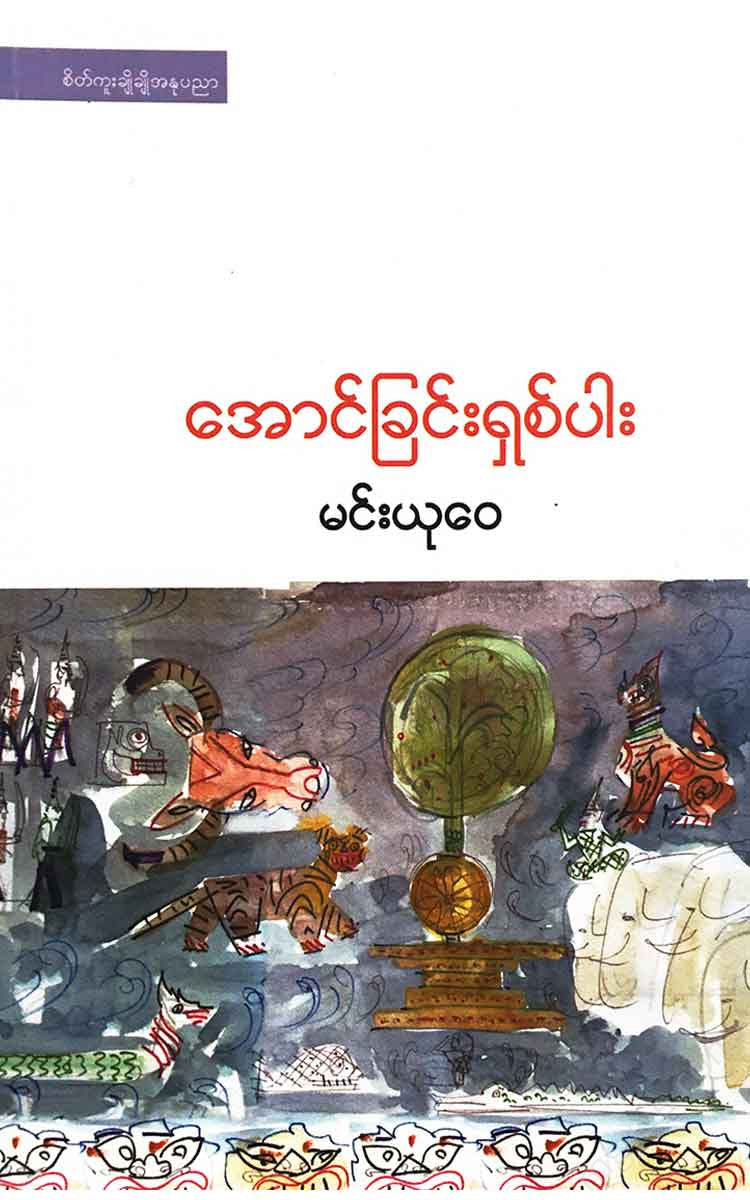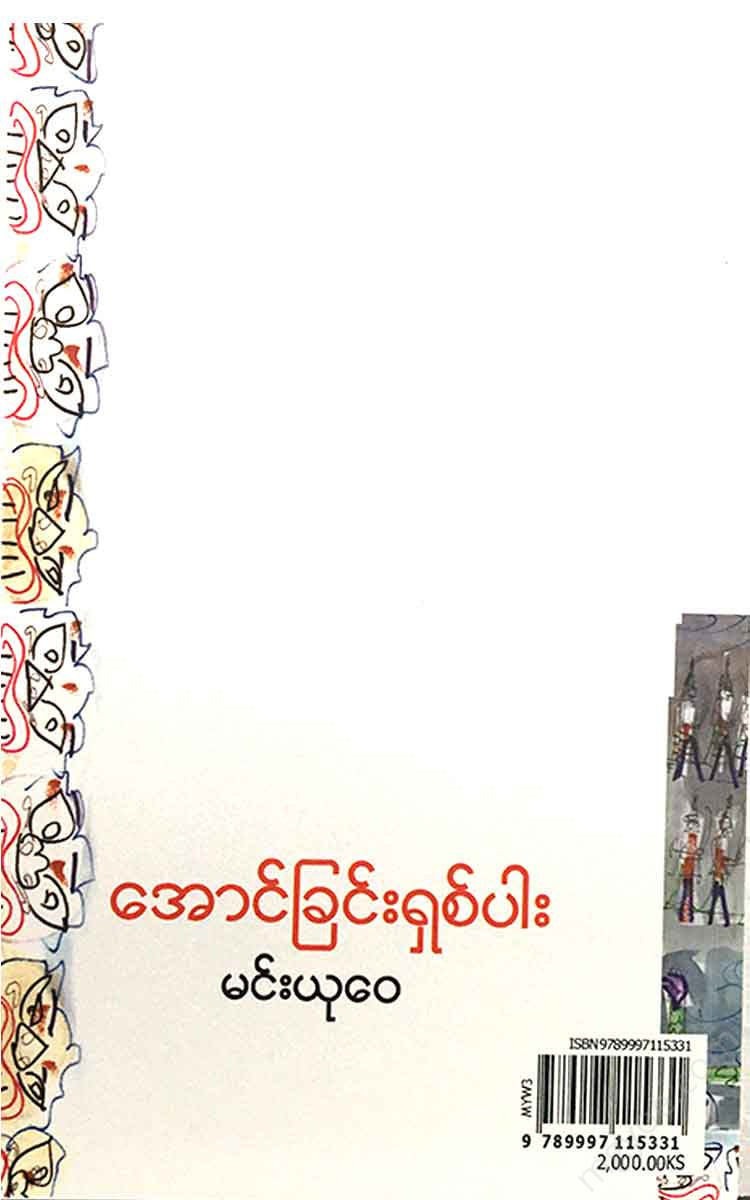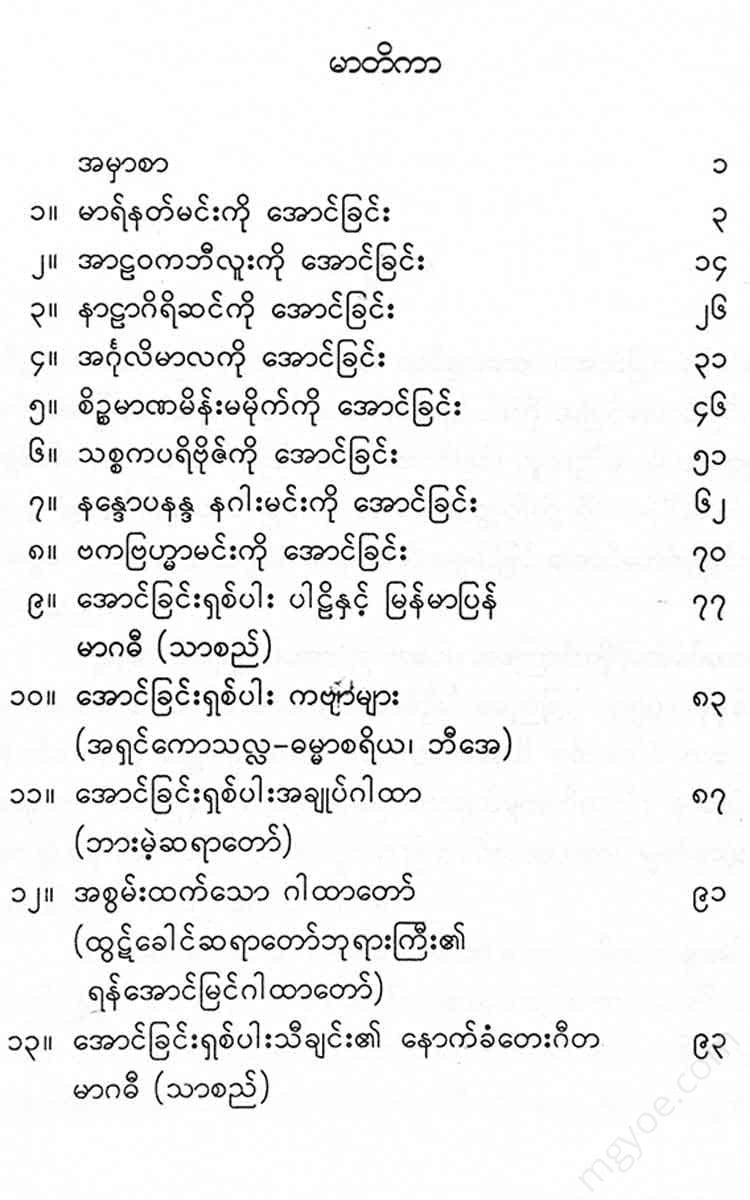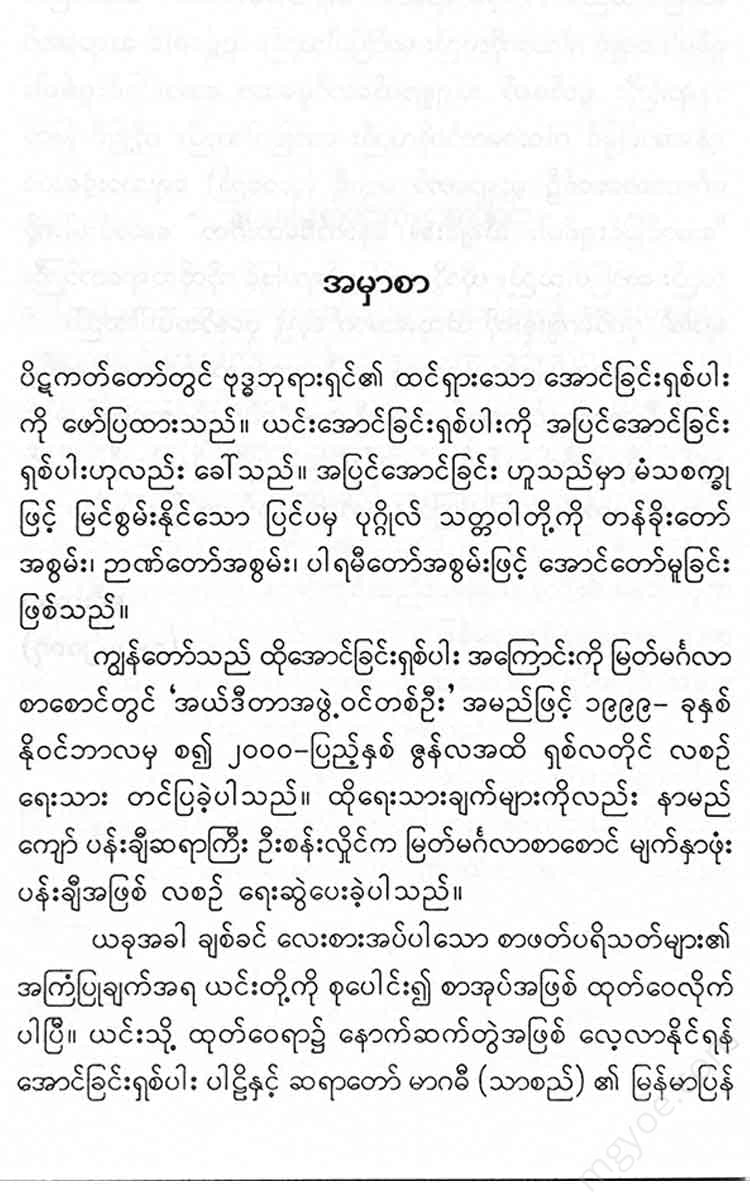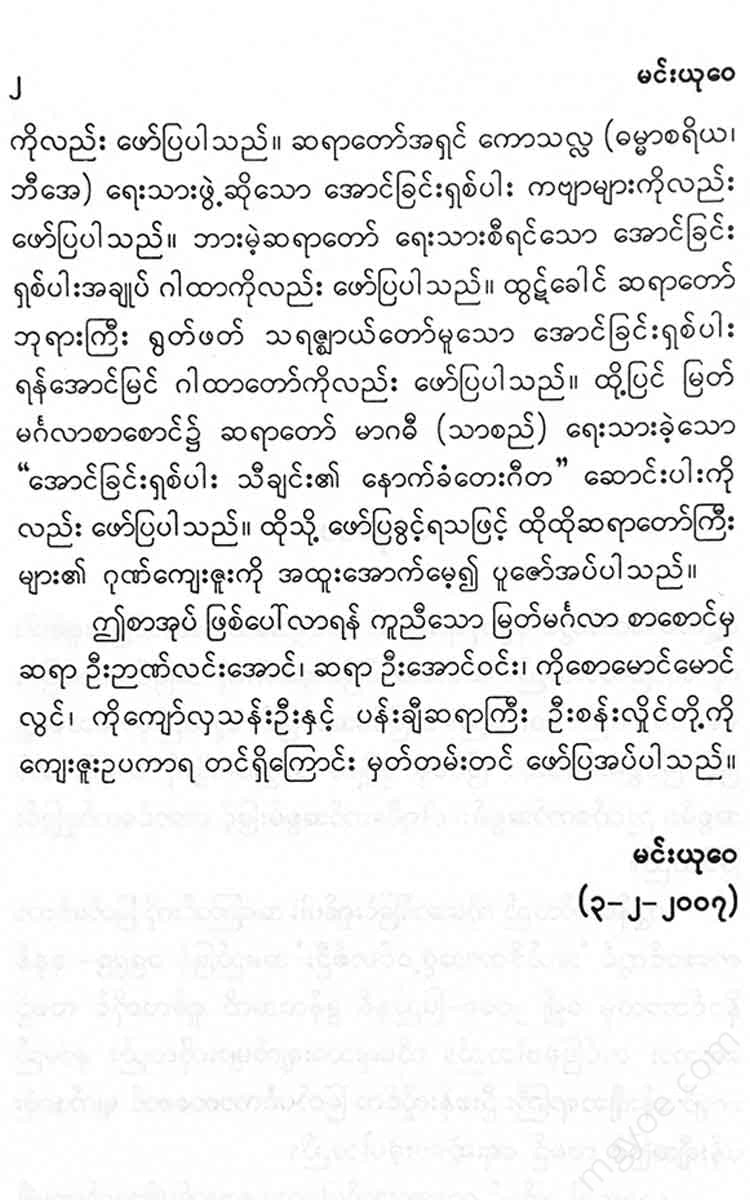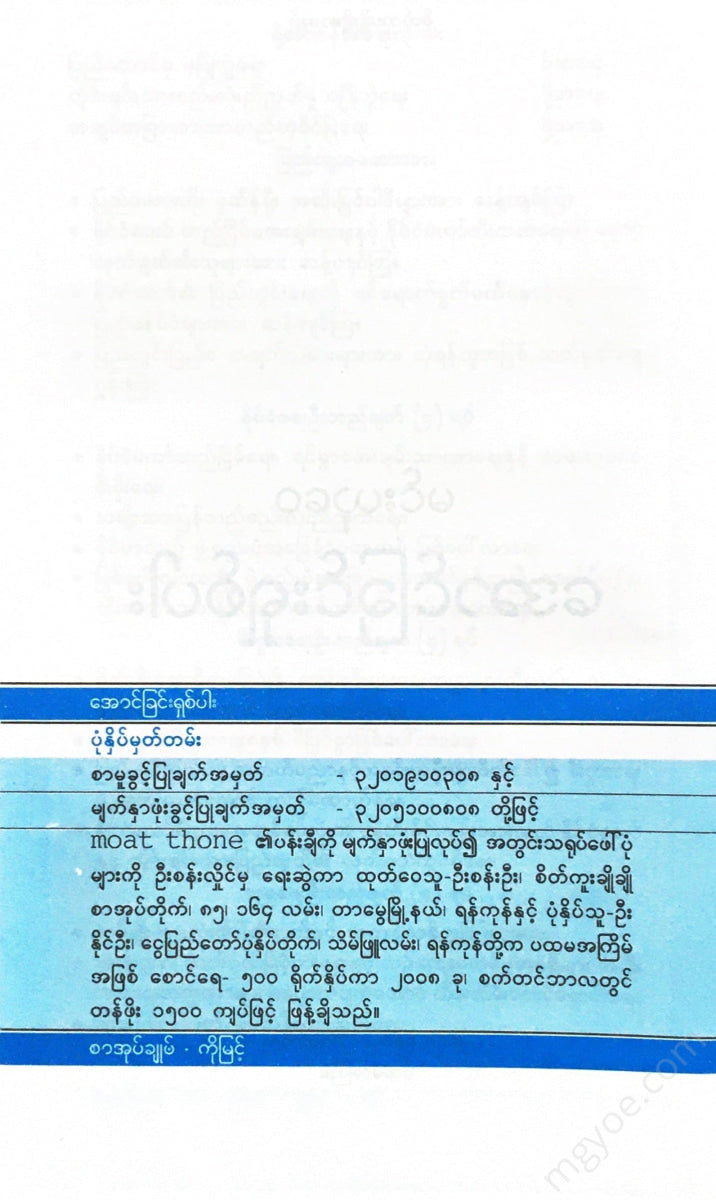စိတ်ကူးချိုချိုစာပေ
Min Yu Wa - Eight Victories
Min Yu Wa - Eight Victories
Couldn't load pickup availability
1. Defeating the demon king
Gautama Buddha's body spent four hundred thousand years and a hundred thousand worlds cultivating the ten perfections to become a Buddha. Then, after practicing the extremely difficult and painful path of self-denial, he attained Buddhahood.
The Buddha was attacked by the demon king Mara before he became a Buddha. After becoming a Buddha, he was attacked by other enemies. However, he defeated both the demon king and all of them with his power, wisdom, and supreme ability.
There are eight enemies. They are external beings that can be seen with the physical eye. Therefore, the Buddha's victory over these enemies is called the eight external victories.
These are (1) defeating the demon Mara, (2) defeating the demon Alavaka, (3) defeating the lion Nalagirisa, (4) defeating the thief Angulimala, (5) defeating the wicked woman Sainsamana, (6) defeating the Sisakka Parivoja, (7) defeating the dragon Nandapananda, and (8) defeating the Brahma king Vaka.
(1) Defeating the demon king
On the cool evening of the full moon day of Kassana, the Buddha's body scattered eight bundles of grass offered by the grass-bearer Sothiya at the foot of the Mahabodhi tree.
The eight blades of grass disappeared from their original form and became a very mysterious jeweled throne measuring (14) meters in size. It stood in a wondrous shape.
The Buddha's body was seated on the jeweled throne, with the Mahabodhi tree behind him, facing the east, and with his legs crossed.
He sat on that throne, pouring forth the meditation of the self-sacrifice, and firmly resolved: (1) If I have any skin left, let it remain; (2) If I have any sinew left, let it remain; (3) If I have any bone left, let it remain; (4) If all my flesh and blood were to wither and disappear, let it be gone; even if I become a Buddha, I will not destroy this throne that I have now built.
Then Brahma, the gods, and many other deities also came to the Buddha's body and stood there to pay homage.
At that time, the demon king Mara came to disturb and destroy. Mara is a destroyer. He has the power to dominate and rule the (11) realms of sensual pleasures. Mara's desire is to keep beings in the sensual pleasures by deluding them with his senses. He does not want anyone to leave his realm, the (11) realms of sensual pleasures.
If the Buddha were to come and preach the Dhamma, many beings would be liberated. They would be liberated from samsara. He did not like this to happen.
That is why the Buddha had forbidden it when he left the forest. Now, because he was about to attain Buddhahood, Mara was filled with grief. He led an innumerable army of his soldiers to harass and destroy the Buddha.
The demon king Mara rides a huge elephant named Girimekhla. He has created a thousand arms. In those thousand arms, he also holds various weapons.
He led the Mara warriors from his abode in the Vasavatti celestial realm to the Bodhisattva's body. Then the devas, the sugarcane, and the Brahmas who were making offerings to the Bodhisattva fled far away.
They just send love, saying, "May the Buddha Siddhartha not die."
But the Buddha's body was not shaken at all. He stood alone, brave and beautiful, in front of all the warriors of Mara.
The demon king Mara and his soldiers arrived at the Buddha's body, but they did not dare to approach it. They stayed at a distance. It was as if flies did not dare to approach the bright, blazing fire.
The demon king Mara and his warriors approached the Buddha's body and threatened him with words that they would make him flee, since he did not dare to fight with his own arms.
They shouted, "Arrest Prince Siddhartha, bind him, cut off his hands, cut off his feet!"
The Buddha, contemplating the ten perfections that he had acquired in the four hundred thousand years and one hundred thousand worlds, sat fearlessly.
The sitting position of the Buddha on the throne (the sitting position) is called a palanquin in Pali. Not only that sitting position, but also the place where the Buddha sits is called a palanquin (throne). Now, no one can attack the Buddha to destroy his sitting position or make him rise from that position. He cannot conquer. This sitting position, which no one can conquer, is called the aparajita palanquin. Aparajita means invincibility.
In all his many lives, the Bodhisattva never made anyone move from the position, honor, or wealth he deserved. He was happy to see anyone in their rightful place. Because of this good will, no one can move the Bodhisattva from this place now. Not just one demon. Even a thousand demons cannot make the Bodhisattva rise from this place.
The demon king Mara did not know this. He thought that if he attacked, he would succeed. Therefore, he first thought that he would blow the Buddha's body away with the wind, and he raised the winds. The winds could break large mountain peaks in two. They were capable of crushing villages and small villages to dust. However, when they reached the Buddha's body, they could not even move the hem of his robe. Then the demon king Mara thought that he would drown the Buddha in the rain. He caused a heavy rain.
However, the rain could not even moisten the Bodhisattva's robes as much as a dewdrop. Here, the demon king Mara attacked with a rain of stones, a rain of weapons, a rain of sand, a rain of scythes, a rain of fire, a rain of lightning, a rain of machine guns, etc.
The Buddha pacified these terrible enemies with the power of his love. Then the demon king Mara approached the Bodhisattva with his sword to throw him off. However, due to the greatness of the Bodhisattva's love, the sword could not attack him. When he came close, he was lying prostrate on the ground. His head was planted in the ground.
Then the demon king slid off the elephant's head and fell to the ground. The demon king was humiliated.
